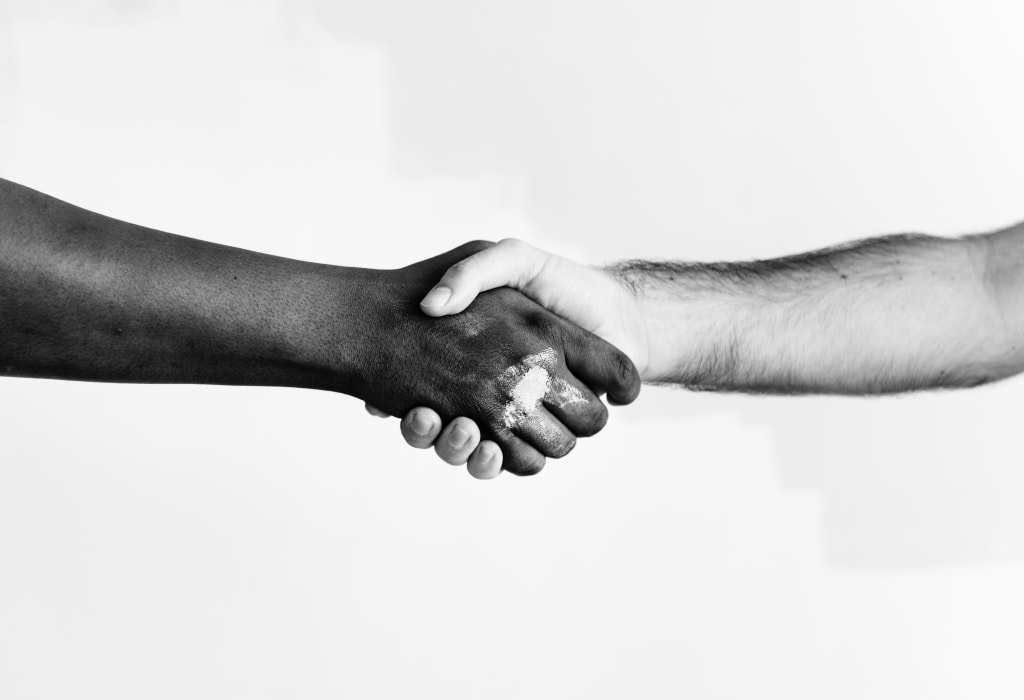Insight into Martin Luther King Jr.'s "I Have a Dream" Speech
Destined for Freedom

One of the major defining moments of the American Civil Rights Movement was when Martin Luther King Jr. delivered his famous "I Have a Dream" speech on the Lincoln Memorial steps on August 28, 1963. His rhetoric has continued to inspire Americans to strive toward achieving "Life, Liberty, the Pursuit of Happiness," and much more (par 4). Within his speech he skillfully used contrasting metaphors, a literary reference, a Biblical reference, and then he weaved it all together with an American patriotic song and an old Negro spiritual. King's plea was to fight with "soul force," not only for freedom but for unity, acknowledging that all people, black or white, share a common destiny (par 9).
King used a lot of imagery in his speech; he helped his listeners form vivid images in their minds so that they could see the brutality and injustice of segregation. He used complementary opposites such as, "joyous daybreak" and "long night of their captivity" (par 2). He spoke of the "lonely island of poverty" contrasting it with the "midst of a vast ocean of material prosperity" (par 3). King urged his audience to find a firm foundation when he described "the quicksands of racial injustice" and the "solid rock of brotherhood" (par 6).
One might suspect that King's line, "This sweltering summer of the Negro's legitimate discontent," was a literary reference (par 7). However, there is little evidence to support that King was, in fact, subtly alluding to John Steinbeck's final novel The Winter of Our Discontent. Interestingly enough, Steinbeck probably drew this title from the first line of Shakespeare's Richard III, "Now is the winter of our discontent." If this truly was a literary reference, then it just adds to the richness of King's speech. King also used Biblical references. One example would be when he quotes a segment from Isaiah 40:5, "and the glory of the Lord shall be revealed and all flesh shall see it together" (par 24). At the end of his speech, the two songs that he references crescendo into this overwhelming wave of emotion. Instead of seeking vengeance, King urged the oppressed blacks to fight with "soul force" (par 9). Freedom wasn't going to be won through more bitterness and hatred; there had been plenty of that from the past century. Rather freedom would be fully gained through the use of words intellect, emotion, and dignified behavior.
One of King's reoccurring cries was America's need for unity. He mentioned how blacks were still "crippled by the manacles of segregation" (par 3). Segregation is, in and of itself, separation—a lack of unity. King knew that it would take unity for the sons of former slaves and the sons of former slave owners to sit down together in peace (par 18). It would take unity for little black boys and girls to join hands with little white boys and girls in love, realizing that they were indeed brothers and sisters (par 22). It would definitely take unity for all of God's children, black, white, Jews, Gentiles, Protestants, and Catholics to all come together in perfect peace and harmony (par 42).
It is when we come together that we understand that we are the same; we share the same destiny. King said that, "their destiny is tied up with our destiny. And they have come to realize that their freedom is inextricably bound to our freedom" (par 9). As Americans, though the color of our skin may vary, we all long for freedom. Our freedom, the rights we fight for, are truly tied together. Once people realize that they are altogether sisters and brothers then the "sweltering...heat of oppression, will be transformed into an oasis of freedom and justice" (par 19). King longed to taste the rich, sweet, water from that oasis of freedom. He greatly desired to rest in the security of reigning justice.
King used many examples of the injustices of the time from the different states. Toward the end of his speech he listed those same places of injustice, however this time he declared that freedom would ring from every mountain top, hillside, and molehill. He had no greater dream than to gain "the riches of freedom and the security of justice" (par 5). King realized that every American, black or white, longed, or needed to be free. The blacks longed for freedom from segregation and racial injustice. Many of the whites needed freedom from past decades of harbored hatred and bitterness.
King knew that 1963 was just the beginning of the fight for freedom. Though he continued to organize and direct peaceful protests in the fight for freedom, his personal efforts were cut short by his assassination in 1968. However, through his modeling of peaceful protest and his determination of justice, his "soul force," he was able to inspire others to carry the torch of freedom (par 9). King fought for unification by using eloquent speech, metaphors, and poignant references. He knew that freedom wouldn't have been as sweet if it hadn't been passionately fought for. That is why he yearned to sing, "sweet land of liberty" with all of America (par 28).
About the Creator
Rowan Finley
Father. Academic Advisor. Musician. Writer. Aspiring licensed mental health counselor. My real name is Jesse Balogh.






Comments
There are no comments for this story
Be the first to respond and start the conversation.